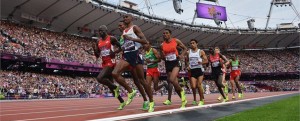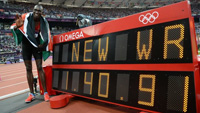Spice Girls, Bolt, Farah or Rudisha
View(s): The razzmatazz of the 2012 Olympic closing ceremony is long over. As one Londoner put it, “If you get The Who, the Spice Girls, Take That, George Michael and the Pet-Shop Boys in one night what more do you want?
The razzmatazz of the 2012 Olympic closing ceremony is long over. As one Londoner put it, “If you get The Who, the Spice Girls, Take That, George Michael and the Pet-Shop Boys in one night what more do you want?
Yet the 2012 Olympics in reality belonged to Bolt, Blake, the ‘Blade Runner’, Farah and the Britons in general along with an unforgettable Kenyan by the name of David Rudisha. They were the newsmakers and they made the Olympics that much more special.
 Yet, the tussle for Olympic supremacy would be fought between the East end and the West end of the globe. It was a long gone factor. It wouldn’t have mattered much if the Chinese finally made it to the top to the rest of the world, but, it was sweet revenge for Uncle Sam’s boys and girls when they ended up with a haul of 46 Golds as against the 38 won by China.
Yet, the tussle for Olympic supremacy would be fought between the East end and the West end of the globe. It was a long gone factor. It wouldn’t have mattered much if the Chinese finally made it to the top to the rest of the world, but, it was sweet revenge for Uncle Sam’s boys and girls when they ended up with a haul of 46 Golds as against the 38 won by China.
For the United States, the 2012 Games saw one of its golden boys Michael Phelps bidding farewell to the Olympic pool which he dominated while Serena Williams’ little tango with her tennis Gold may not be forgotten by many of the people who witnessed it.As for the Chinese they take their Golds with implanted grit that work like clockwork in their system.
 As for the Britons who were hosting the Olympic Games for the third time in two centuries and the only country in history to do so had some passion mixed into the occasion. Britain became the only country in history to have participated at every games since the Games were revived in 1896 and is also the only country to win at least one Gold in every Games.
As for the Britons who were hosting the Olympic Games for the third time in two centuries and the only country in history to do so had some passion mixed into the occasion. Britain became the only country in history to have participated at every games since the Games were revived in 1896 and is also the only country to win at least one Gold in every Games.
In London there was a Union Jack fluttering in some form or the other in every nook and cranny. In this diversified nation citizens of every colour and creed took the Games on its stride except for one elderly gentleman who walked up to me at the bus-stand and complained about the new taxes that he has to pay because of the Olympics.
 He said: “the Mayor of London must be mad to bring this thing into England.” For me that also was a part of the scenario and I thought that at least one man is anti-establishment. During the first five days of the Games, the whole of Great Britain was in a quandary when the Gold eluded them. But, when women rowers Helen Glover and Heather Stanning broke the ice the great gold rush for Great Britain was triggered off. Like I once said there was inspiration and an entire nation just went for it.
He said: “the Mayor of London must be mad to bring this thing into England.” For me that also was a part of the scenario and I thought that at least one man is anti-establishment. During the first five days of the Games, the whole of Great Britain was in a quandary when the Gold eluded them. But, when women rowers Helen Glover and Heather Stanning broke the ice the great gold rush for Great Britain was triggered off. Like I once said there was inspiration and an entire nation just went for it.
There is not much to explain the track dominance of Usain Bolt because upon my return I learned many Lankans had sacrificed their sleep to watch the king of the track in action at least on three occasions. For me it was an experience of a life time and I only have to close my eyes and the re-run begins. Besides Bolt, my other London heroes were Mo Farah and David Rudisha. In reality we must discuss these two athletes a bit more.
Mo Farah
For the major portion of the world population, Bolt might have been the track athlete of the meet, but as for me Farah certainly should muster enough votes for runner-up position. Winning both the 5,000m and 10,000m in the same Olympics is extremely rare (he’s just the sixth runner to have done it) and yet history might not give Farah his due respect until 2016 when someone tries it again. (Somehow the Somali-born Brit doesn’t seem to be getting the same adoration outside the United Kingdom that was hailed upon Kenenisa Bekele four years ago, even though Farah beat Bekele in the 10,000m.)
Farah was the fittest runner on the track, took command of each race at precisely the right moment, and used a perfectly timed kick to secure his spectacular double. The only remaining questions for now are: How was his coach Alberto Salazar able to maximise the potential of Farah. He was good but not great before he arrived in Beaverton, Ore., last year. How long can Farah, who is 29, remain on top of the world?
David Rudisha
I wonder if you would agree if I say that by far the single-most extraordinary track performance of the London Olympics was Rudisha’s world-record run in the men’s 800m. The 23-year-old Kenyan’s win was perhaps the most predictable of any event at the Games; he became increasingly more dominant as he has emerged over the past three seasons, we learn.
Yet, his Olympics race was even more special, because he ran into uncharted territory and it was labelled as the fastest 800m race in history. His 1:40:91 clocking looks and sounds even more obscure and unfathomable than Sebastian Coe’s 1:41:71 in 1981. For many it was clear that Rudisha would soon dip into the once-unthinkable sub-1:41 territory. But now that he’s actually done it, it still doesn’t seem possible. In some ways, it seems akin to an Usain Bolt running an 18.99 in the 200m, but really it opens up the possibility of Rudisha eventually running a completely ridiculous sub-1:40 in the next few years.
Meet you in Rio de Janeiro.
comments powered by Disqus


























